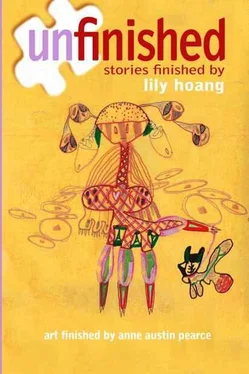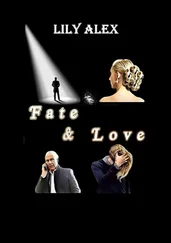Lily Hoang - Unfinished - stories finished by Lily Hoang
Здесь есть возможность читать онлайн «Lily Hoang - Unfinished - stories finished by Lily Hoang» весь текст электронной книги совершенно бесплатно (целиком полную версию без сокращений). В некоторых случаях можно слушать аудио, скачать через торрент в формате fb2 и присутствует краткое содержание. Издательство: Jaded Ibis Press, Жанр: Современная проза, на английском языке. Описание произведения, (предисловие) а так же отзывы посетителей доступны на портале библиотеки ЛибКат.
- Название:Unfinished: stories finished by Lily Hoang
- Автор:
- Издательство:Jaded Ibis Press
- Жанр:
- Год:неизвестен
- ISBN:нет данных
- Рейтинг книги:5 / 5. Голосов: 1
-
Избранное:Добавить в избранное
- Отзывы:
-
Ваша оценка:
- 100
- 1
- 2
- 3
- 4
- 5
Unfinished: stories finished by Lily Hoang: краткое содержание, описание и аннотация
Предлагаем к чтению аннотацию, описание, краткое содержание или предисловие (зависит от того, что написал сам автор книги «Unfinished: stories finished by Lily Hoang»). Если вы не нашли необходимую информацию о книге — напишите в комментариях, мы постараемся отыскать её.
Unfinished: stories finished by Lily Hoang — читать онлайн бесплатно полную книгу (весь текст) целиком
Ниже представлен текст книги, разбитый по страницам. Система сохранения места последней прочитанной страницы, позволяет с удобством читать онлайн бесплатно книгу «Unfinished: stories finished by Lily Hoang», без необходимости каждый раз заново искать на чём Вы остановились. Поставьте закладку, и сможете в любой момент перейти на страницу, на которой закончили чтение.
Интервал:
Закладка:
XVIII.
The Big Book sits on a coffee table in the middle of the Museum of Oddities and Eccentricities. During most of the day, there is a spiraling line of employees around the Big Book. One curator, usually Curator 26039, stands next to the Big Book and reads what the Big Book says to the employee desiring a personality. Some days, however, Curator 26039 does not remember his responsibility, as he is still unused to being Curator 26039. Those days, the employees do not make an orderly spiraling line around the Big Book. Those days, the employees are savages. They fight and plunder to get to the Big Book, and they claw and rip — saliva dripping from the corners of their foaming mouths, eager to know who they are — and, if they are lucky, Curator 26039 will find his number in the Big Book early enough in the chaos to restore order. Sometimes, if any person thinks of it, the museum’s entropist is entreated to set things aright. However, on unlucky days, employees are fated to continue fighting this way until the end of the day. Then, they go home and hope that tomorrow, Curator 26039 will remember his rightful responsibility and the Museum of Oddities and Eccentricities will once again have its mechanical flow restored.
XIX.
When Gretchen won the dollhouse in a heated game of Go Fish, she decided that dollhouses are useless but dolls are not. Nor are the rooms. Having been fascinated with architecture for her entire life, she tore off the top of the dollhouse and offered her bare fingers. One by one. Inside, she saw a resplendent world, corners that were warped and rooms waiting for magic to be divined upon them. Being a kindly god, she gave the dollhouse a roof made of glass, so those inside could always see her. She took her little godly fingers and indented the glass at some points and pinching it up to peaks at others. From the outside, Gretchen came up with certain rules and regulations for the inhabitants of the dollhouse. Periodically, she would lift the glass ceiling and put some things in: knickknacks and little boys she firmly disliked.
From outside, she would peer in and think what an inadequate name ‘dollhouse’ was for this structure housing such potential and possibility.
Then, one day, she came up with a name — the Museum of Oddities and Eccentricities. Everyday, after a long day of school, Gretchen would run home to see what her little curators and employees and mean little boys from school who magically disappeared from the outside world — a serial kidnapper of mean little boys, the papers called it! — were doing. Some days, if there were problems, she would fix them. Other days, she would simply watch, knowing how easily order could be restored, if it only fit her fancy.
XX.
One day, after years of dedication, Gretchen, rather than run home to care for her hundreds of millions of minions that she alone created for her Museum, Maggie invited her to go to the mall to get a new bathing suit. And Gretchen went. At the mall, Maggie asked Gretchen about that ‘stupid dollhouse,’ if she remembered, if she still had it, and Gretchen laughed while rolling her pretty doll eyes up to the sky.
XXI.
There are no women in the Museum of Oddities and Eccentricities, except for the Donor, but she never actually steps foot in the Museum. Gretchen endows the Museum entirely. Everything that happens within the confines of the Museum must be approved by the Donor first, and although the Donor is both kind and generous, she has her own unique vision for the Museum, and she rarely sways from her vision.
Only once have the employees convinced the Donor against her wishes, and they would not have been able to change her mind had they not gone on strike, and had their idea not been so very pragmatic that even the Donor could not deny its positive attributes. And after the quarrels and after the strike, after the mediations and after the negotiations, after the employees had their clear glass ceiling without even a smudge of discolored tinting, they began to think that maybe the whole thing was the Donor’s idea all along. They thought that maybe the Donor was playing coy so that they — the employees — would think they had some sort of autonomy where autonomy simply does not exist. Then, they think to themselves, We are fools! They think to themselves, We men are just such fools!!
XXII.
Curator 93 spends his days in the library researching for the Donor. The research topics are not disclosed to any other person. Curator 93 is given the wretched and insignificant task of gathering knowledge, recording history, and at times, doing homework for the Donor. Although it is not always a pleasurable endeavor, Curator 93 fully understands how important his job is, how important he is, and as such, the moment he received — or stole, depending on how you want to look at it — Curator 93’s placard, he pinned it to a shirt worn inside another shirt. The outside shirt displays some other curator number. This is the placard that is stolen and swapped, exchanged and shifted, but deep down, he is Curator 93. He has always been Curator 93, and he will always be Curator 93.
XXIII.
The employees do sometimes wonder what the Donor looks like, as they have never seen her. The Donor speaks through an intermediary who takes the form of a large, disembodied face. They have named the face Gretchen. She appears for several hours a day between Saturn and the Sun. Sometimes, she blocks the setting Vulcan, but this does not happen often. They can set their clocks to Gretchen, until one day, she stops appearing. Until one day, the Donor stops donating, and they are truly free.
XXIV.
Curator 72348 is the first to notice it. When Gretchen is not in the sky, the employees can look down at the Floor of Incarnations and see who they were before they were employees at the Museum of Oddities and Eccentricities. When Curator 72348 looks down, he sees not just a man but an entire family. They look familiar, but he cannot recognize himself. He calls up to Gretchen. He says, Gretchen! Gretchen! Who are these persons?
But Gretchen does not answer. Gretchen will never answer again. But that does not mean they do not stop calling to her.
XXV.
The Big Book clogs literature. The Big Book contradicts the hopeless fake. The Big Book insults the complaining critic. The Big Book bends the holy refrain and the provisional why. The Big Book is the nearest deterrent. The Big Book enlightens zeros and numbs heroes. The Big Book mends the empire. The Big Book hunts. The Big Book whistles outside a yard. The Big Book builds the unseen. The Big Book romances the unfamiliar rut. The Big Book shelves philosophy. The Big Book is an ink revolt. The Big Book balances the universe with wicked language. The Big Book bubbles and smokes. The Big Book is an unrestricted smile. The Big Book inspires resolve without a wreck. The Big Book hides the eminent dust. The Big Book completes an outdated trilogy.
james’s grandfather (from Trevor Dodge)
James’s grandfather always said that Frey was a dead ringer for the boys’ grandmother. He usually said this when Frey got himself into trouble, which he did every time he got near his grandfather. James, on the other hand, never gets caught.
Their grandfather would say, “Frey, you little fucker, you look just like your fucking grandmother when she’s fucking another man.”
And together, they’d pout their twin pout.
James’s grandfather just could not control himself when he saw them.
It was never clear to James or Frey as children why their grandparents lived in the same house. They fought violently over anything: what was cooked for dinner, the way it tasted in their old mouths, the matching silverware. They talked openly of their disgust for one another at Thanksgiving, Christmas, and Easter dinners. They viciously plotted against each other by intentionally overdrawing their bank accounts and bouncing mortgage checks. It wasn’t that they didn’t have the money. They simply enjoyed watching the humiliation of the “declined” look some waiter or whoever would give. They would be even more proud, depending on how many other witnesses were present.
Читать дальшеИнтервал:
Закладка:
Похожие книги на «Unfinished: stories finished by Lily Hoang»
Представляем Вашему вниманию похожие книги на «Unfinished: stories finished by Lily Hoang» списком для выбора. Мы отобрали схожую по названию и смыслу литературу в надежде предоставить читателям больше вариантов отыскать новые, интересные, ещё непрочитанные произведения.
Обсуждение, отзывы о книге «Unfinished: stories finished by Lily Hoang» и просто собственные мнения читателей. Оставьте ваши комментарии, напишите, что Вы думаете о произведении, его смысле или главных героях. Укажите что конкретно понравилось, а что нет, и почему Вы так считаете.






![О Генри - Неоконченный рассказ [An Unfinished Story]](/books/415443/o-genri-neokonchennyj-rasskaz-an-unfinished-story-thumb.webp)





